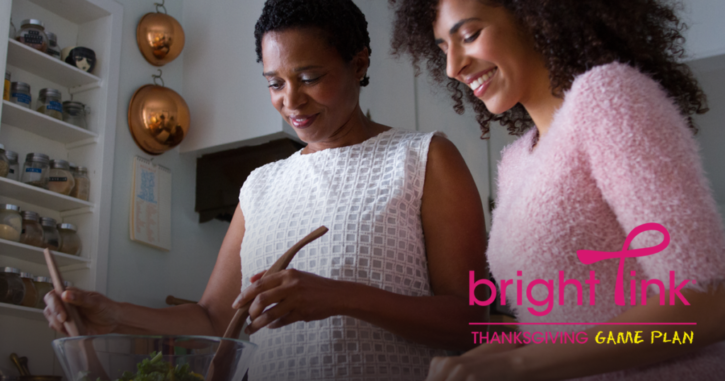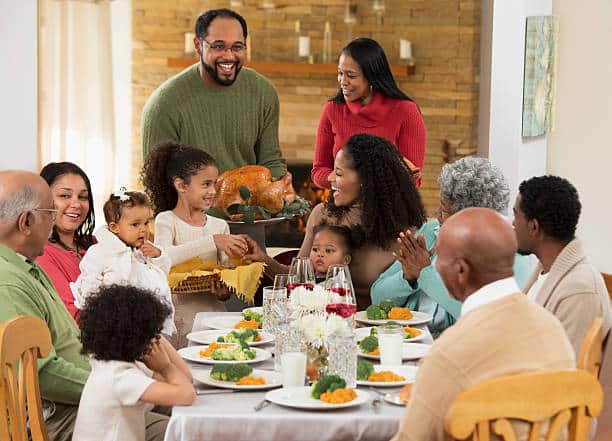 For some, being home for the holidays means lots of extra family time, often with multiple generations coming together to celebrate under one roof. Most likely, your conversations at this time will center around what’s new at work or what trip you went on over the summer. This November, we’re asking you to take advantage of this rare opportunity to take the conversation in a different, proactive direction.
For some, being home for the holidays means lots of extra family time, often with multiple generations coming together to celebrate under one roof. Most likely, your conversations at this time will center around what’s new at work or what trip you went on over the summer. This November, we’re asking you to take advantage of this rare opportunity to take the conversation in a different, proactive direction.
Bright Pink is a national nonprofit focused on the prevention and early detection of breast and ovarian cancer. As up to 25 percent of breast and ovarian cancers are familial or hereditary, having an understanding of your family health history landscape can act as a powerful roadmap for you and your healthcare provider. We want to help you understand why it’s important, what information to collect, and what to do with your family health history when it’s collected.
The Facts
Having a first-degree relative (a mother, sister, or grandmother) who has had breast or ovarian cancer can double your risk. And, if their cancer was the result of a genetic mutation, that can be passed down across generations by either parent. When this happens, your risk of breast cancer can be as high as 87% and as high as 54% for ovarian cancer.
There are many actions that women can take to reduce their risk or detect these cancers early (the 5-year survival rate for breast and ovarian cancer when detected early can be greater than 92 percent!), but it takes an initial understanding of that risk to identify what actions may be most meaningful for your health.
RELATED: Are These 5 Health Conditions In Your Family Tree?

Your Thanksgiving Game Plan
Between travel delays, turkey cooking time, and holiday shopping plans, the holidays can become jam-packed. That’s why Bright Pink wants to help equip you with the tools you need to gather your family health history and assess your risk, and a game plan to fit it all into what can be a hectic long weekend.
Step 1: Collect your questions beforehand.
When looking at your family health history, both your parents’ sides are equally important in determining your personal level of risk. While breast and ovarian cancer history are important, other types of cancer can also be indicators of an inherited genetic risk, so capture everything you can. Ask:
- Who had cancer?
- What type of cancer?
- How old were they at diagnosis?
Step 2: Explain why you are asking.
These conversations can be difficult, and talking about family health history may not be part of your normal dinner discussions. Consider starting the conversation this way: “I recently read about how family health history information can help prevent disease or diagnose it early. I realized that I don’t know much about this in our family! Do you mind if I ask a few quick questions to help understand what this could mean for my health?” Or, bring it up while discussing what you’re thankful for – your health, something that generations of women before us didn’t have access to. When you know your risk, you can be proactive!
Step 3: Collect what you can.
This process isn’t foolproof, and you may have to do some digging to get all of this information. If you aren’t able to answer every question, don’t let that discourage you. You’ve taken an amazingly proactive step by collecting what you can.
Step 4: Assess Your Risk
After you’ve learned as much as you can about your family health history, it’s time to put that knowledge to work. Visit AssessYourRisk.org to complete a digital quiz that asks questions about your family health history, personal health history, and lifestyle to deliver a personalized report on your baseline risk for breast and ovarian cancer. Email this report or print it and bring it to your next primary care appointment!
RELATED: Capture Your Family’s History, One Story At A Time!
A New Thanksgiving Tradition
The last item of your game plan might be the most important: sign up for Bright Pink emails so we can remind you to ask about family health history again next year. This isn’t a one-and-done practice. Family health history can change from year to year. A new development could end up being the most important piece of information you need to be proactive about your health.
Make sure you’re following Bright Pink on Facebook, Instagram, and Twitter for Thanksgiving Game Plan tips and inspiration all week leading up to Turkey Day.









